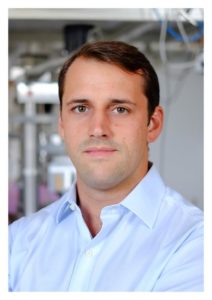John Kolinski studied both engineering mechanics and mathematics at the University of Illinois at Urbana–Champaign and graduated with Bachelor’s degrees in both subjects in 2008, before earning a Master’s degree in applied mathematics (Sc.M.) and a PhD in applied physics from Harvard University, in 2010 and 2013, respectively. His PhD thesis on “The role of air in droplet impact on a smooth, solid surface” was supervised by Lakshminarayanan Mahadevan and Shmuel Rubinstein. Supported by a Fulbright-Israel post-doctoral fellowship, he moved in 2014 to Israel to work with Eran Sharon and Jay Fineberg at the Racah Institute of Physics at the Hebrew University of Jerusalem. There he studied the inter-facial instabilities in fluid and solid systems such as water bells and the fracture of hydrogels. Since May 2017, Kolinski has been a Tenure Track Assistant Professor at EPFL and the head of the Laboratory of Engineering Mechanics of Soft Interfaces (EMSI) at EPFL’s School of Engineering. He can be found on Twitter @emsi_lab_epfl.
Read John’s Emerging Investigator article “Air mediates the impact of a compliant hemisphere on a rigid smooth surface” and check out all of the 2021 Soft Matter Emerging Investigator articles here.
How do you feel about Soft Matter as a place to publish research on this topic?
Soft Matter is an excellent journal. My manuscript was handled efficiently and rapidly, and the referee reports helped to improve the scope of our study.
What aspect of your work are you most excited about at the moment and what do you find most challenging about your research?
I am very excited about the work we are doing in probing the stability of soft interfaces, from dynamic impact to fracture mechanics. Some of the main challenges in this work are technical and experimental in nature – we are looking to push the boundaries for how well we can measure material deformation at interfaces, particularly in 3D, for instance. For our lab, which focuses primarily on experiments, we work hard to expend the domain of what our tools can offer us in terms of useful data.
In your opinion, what are the most important questions to be asked/answered in this field of research?
Soft matter as a field is full of amazing questions, with many of the key questions related to geometry, and an incredible breadth of applicability, from biology to medicine to robotics. The central role of geometry in soft matter is a consequence of the large deformation that soft materials can undergo – often, the non-linearities that arise due to geometry are challenging to model, and require experiments to advance the science. At the end of the day, the study of these materials can lead to very useful applications. While we are not working on applications directly, we try to remain attentive to the needs of engineers working with soft matter, as well as the natural systems comprised of soft matter. Specifically, soft robotics, and medical implants / human machine interfaces stand to benefit from an improved understanding of the mechanics of soft materials. These applications are incredibly important to society, and provide great motivation for our day-to-day work on the fundamental mechanics of soft materials.
Can you share one piece of career-related advice or wisdom with other early career scientists?
I hesitate to offer unsolicited advice to strangers 🙂 I can only comment on my experience – I have never gone wrong pursuing interesting questions that I find to be challenging, and working in collaboration with people who are smarter than me to address them.











